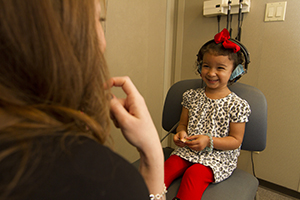TTUHSC Researcher to Collaborate with Lubbock ISD for Research Project
 Texas Tech University Health Sciences Center (TTUHSC) School of Health Professions
Department of Speech, Language and Hearing Sciences faculty is working with kindergarten
students from school districts in Lubbock County as part of a new research project
for the 2016-17 school year.
Texas Tech University Health Sciences Center (TTUHSC) School of Health Professions
Department of Speech, Language and Hearing Sciences faculty is working with kindergarten
students from school districts in Lubbock County as part of a new research project
for the 2016-17 school year.
According to the U.S. Department of Education, approximately 1.4 million children in public schools have a diagnosed language impairment. The long-term implications of language impairment can be severe, with about 50 percent of kindergarten children with language impairments being diagnosed with reading disabilities in the second and fourth grade. As young adults, only about 14 percent of children diagnosed with language impairment enter college. Researchers for the project will work with Lubbock County kindergarten students with language impairment in order to improve their behavior regulation skills – attention, memory and inhibition – to improve their academic success.
“There is a critical need to identify effective strategies for improving the behavior regulation skills of kindergarten children with language impairment,” said Mary Beth Schmitt, Ph.D., assistant professor of speech and hearing sciences. “Without these strategies, kindergarteners with language impairment are quite likely to experience academic failure related to diminished language and literacy.”
Schmitt, who recently was awarded a grant from the National Institutes of Health (NIH) for this project, is identifying effective strategies for improving behavior regulation skills in children with language impairment. Existing studies have indicated that children with language impairment who utilize behavior regulation skills during therapy make better progress in language than peers who do not. Schmitt’s research project hopefully will lead to a model strategy to be used by other professionals working with children with language impairment to obtain the best possible benefit from their therapy.
School of Health Professions Dean Lori Rice-Spearmen, Ph.D., said the NIH grant indicates the national and global significance this project could have in improving academic outcomes for the more than 50 million children in U.S. public schools, many of whom have language impairment.
“The School of Health Professions takes pride in the confidence NIH has expressed in Dr. Schmitt’s research by funding this groundbreaking project,” Rice-Spearman said. “Certainly, the findings of this work could be transformative in the lives of children with language impairment locally and around the world.”
Related Stories
Celebrating Veterans: TTUHSC’s General Martin Clay’s Legacy of Service and Leadership
From his initial enlistment in the Army National Guard 36 years ago to his leadership in military and civilian health care management roles, Major General Martin Clay’s career has been shaped by adaptability, mission focus and service to others.
Texas Tech University Health Sciences Center School of Nursing Named Best Accelerated Bachelor of Science in Nursing Program in Texas
The TTUHSC School of Nursing Accelerated Bachelor of Science in Nursing (BSN) program has been ranked the No. 1 accelerated nursing program in Texas by RegisteredNursing.org.
TTUHSC Names New Regional Dean for the School of Nursing
Louise Rice, DNP, RN, has been named regional dean of the TTUHSC School of Nursing on the Amarillo campus.
Recent Stories
National Academy of Inventors Names TTUHSC Faculty Senior Members
The National Academy of Inventors (NAI) has designated two current and one former TTUHSC faculty researchers as Senior Members.
The John Wayne Cancer Foundation Surgical Oncology Fellowship Program at Texas Tech University Health Sciences Center Announced
TTUHSC is collaborating with the John Wayne Cancer Foundation and has established the Big Cure Endowment, which supports the university’s efforts to reduce cancer incidence and increase survivability of people in rural and underserved areas.
TTUHSC Receives $1 Million Gift from Amarillo National Bank to Expand and Enhance Pediatric Care in the Panhandle
TTUHSC School of Medicine leaders accepted a $1 million philanthropic gift from Amarillo National Bank on Tuesday (Feb. 10), marking a transformational investment in pediatric care for the Texas Panhandle.
